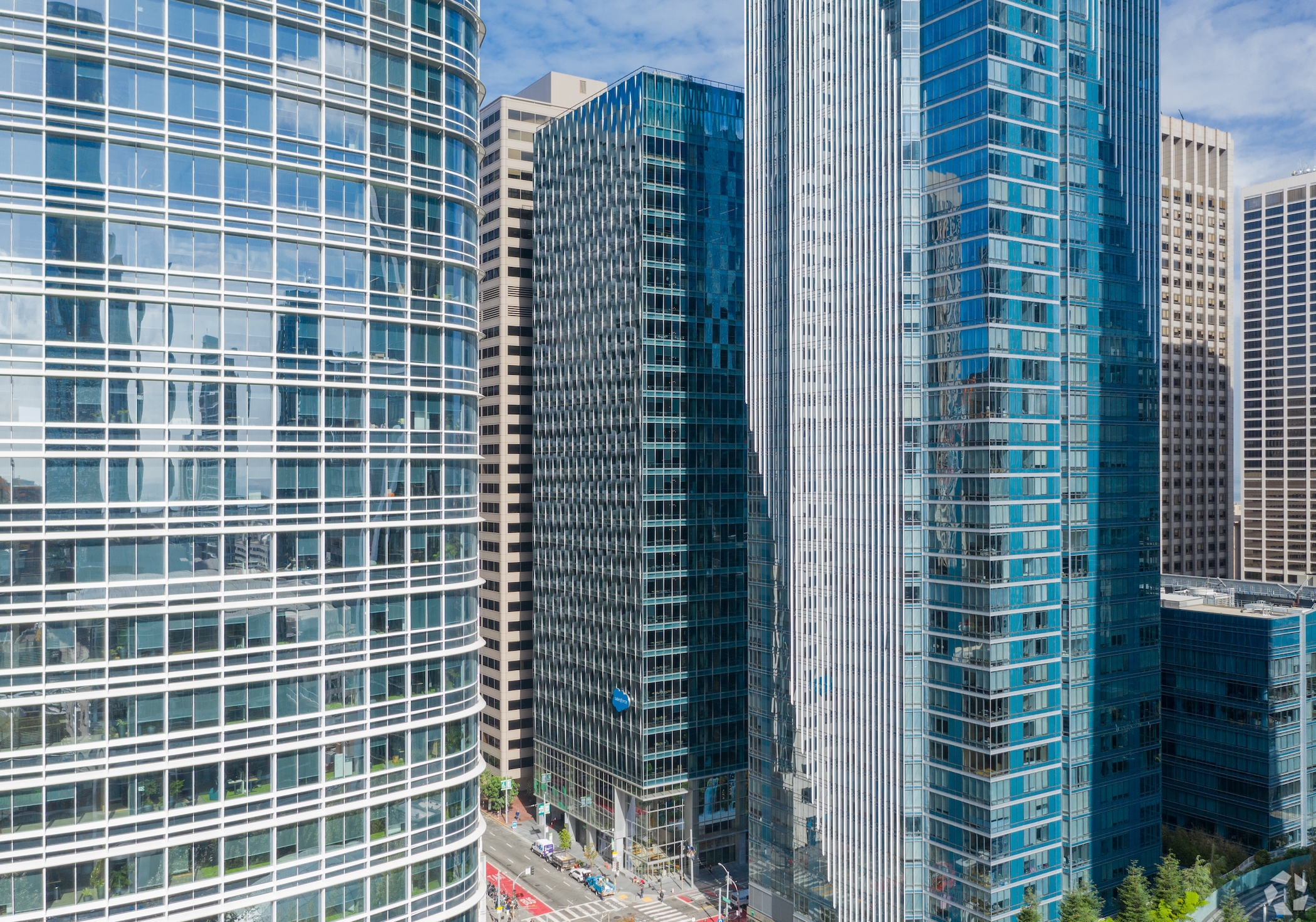As the 2010s came to a close, tech workers would swarm around the Salesforce Tower in downtown San Francisco on weekday mornings, filling the nearby cafes, light rail stations and soaring office buildings stacked with companies eager to lease distinctive space.
More than three and a half years later, the weekday scene is far quieter, with many workers at home on any given workday. The pandemic spurred early-stage startups and international tech heavyweights to shift to remote, hybrid and flexible work models that led them to reduce, relocate or completely vacate office properties across the country.
Companies are still investing in physical space, but on a smaller, more dispersed scale. Customer service software maker Salesforce has taken a long-term lease at a ranch in a remote Silicon Valley mountain suburb, while search engine giant Google has adopted outdoor work campuses and "Team Pods." Tech companies are entering a workplace transition that could have a lasting effect on some of the most prominent and expensive U.S. office markets.
"Companies are being smarter with their dollars," said Samantha Martz, a JLL executive vice president and leader of its High-Growth Technology group in San Francisco. "They were leasing a ton of space in the days before the pandemic, but now the approach is to lease a smaller amount that can be used extremely purposefully in order to let teams be more productive and to have those in-person moments be valuable. Yes, maybe it isn't five days a week, but when workers do come in, that time is very important and impactful."
The shift means technology companies large and small — many of which are competing for top talent — will walk a tightrope between using their real estate as a means for growth and coming to terms with a new economic landscape.
To be clear, in-person work where many employees are in a building surrounded physically by colleagues is still highly valued, real estate professionals say. There's just a whole lot of variation that's been emerging on where, when and how that happens.
"It will be a balancing act," said Robert Sammons, Cushman & Wakefield's Northwest regional director, who for decades has focused on tech company office space and leasing trends. "Many want to save the money on space but know the value of in-person work. Does that mean they need as much physical space? Possibly, but it's now a whole new world."

Better but Not Bigger
By the end of 2020, the tech industry accounted for about one-fifth of the country's total office leasing activity, according to data from CBRE, as some of the largest companies — including social media company Facebook's parent Meta, iPhone maker Apple, software provider Microsoft and investment platform Robinhood — invested in the idea that offices would play a critical role in the future of work.
Tech companies were some of the country's greatest sources of leasing and acquisition activity prior to the pandemic, scooping up hundreds of thousands of square feet to accommodate yearslong headcount growth among workforces that largely commuted to an office every workday. These global tech firms accounted for more than a third of the nation’s largest 15 office leases in 2019, according to CoStar data. Deals made by Google, Amazon, Apple, Meta and others collectively totaled more than 5 million square feet.
Now, however, companies are adjusting to in-person attendance at just a fraction of pre-COVID levels and are evaluating space on a quality-versus-quantity basis.
"Amenities and access are more important than they've ever been,” Sammons said. “Now it's about finding built space and not having to spend as much in capital expenditures as possible."
Technology leasing activity dropped by nearly 50% in the second quarter of 2020 compared to the same time in 2019, according to CBRE. Tech companies now account for more than a quarter of the nation's roughly 218 million square feet of sublet space on the market, underscoring the industry’s eagerness to offload unneeded and unwanted offices.
Tech companies were among the first to shut down offices ahead of the national COVID outbreak 2 1/2 years ago, creating a blueprint for employers in how to navigate the forced shift to hybrid and remote work. In the time since, a division has formed between large tech companies that continued to expand their real estate portfolios and small- to mid-size companies, many of which have flooded the national office market with sublet space as they struggled to justify the expense of maintaining offices with a predominantly remote workforce.
"A lot of it depends on what a tech company does, since software companies can go remote more easily than hardware-focused ones," Sammons said. "If you're more of a research-and-development occupier then you need at least some teams in the office a few days a week, if not all the time."

Seeking Flexibility
For those willing to spend on space, JLL’s Martz said there is a greater emphasis on hospitality-minded amenities including chef-led kitchens and massage therapy rooms that make workers want to return to their offices, a trend spreading beyond the tech industry into the broader office market.
"The big question now is how space can be flexible and attractive, and for some companies, that has meant almost spending more money on space than before the pandemic, even if that space is smaller than before,” she said. “We're seeing that in cities across the board where nice spaces are going for more than they did pre-pandemic."
The increased demand for top-quality space has also spotlighted sublet availability, which is often fully built out, located in high-end properties and at a discount compared to market rates. Online review company Yelp, for example, ditched its former 161,875-square-foot San Francisco headquarters last year. Several months later it subleased space that amounted to roughly one-third of its original footprint from fellow tech giant Salesforce at 350 Mission St.
Perhaps the most dramatic shift, however, has been the growth of an emerging cohort of tech companies that are more interested in expanding to other cities rather than concentrating on a single main campus.
The pandemic spurred workers to spread out across the country, and companies are looking to meet them where they are, investing in setting up satellite offices to provide space whenever and wherever it's needed.
Google, for example, opened multiple outposts around its Mountain View, California, headquarters campus and is also spending upwards of $7 billion to extend its presence to Chicago, New York, Los Angeles, Atlanta, Houston, the D.C. suburb of Reston, and elsewhere.
It is also building several outdoor work areas like its "Camp Charleston," a fenced-in spot outside its Silicon Valley headquarters that is about the size of four tennis courts and is outfitted with Wi-Fi service and wooden deck flooring. The company said earlier this year it would build similar outdoor work spaces in London, Los Angeles, Munich, New York and Sydney, and was considering other locations as well.
The company did not respond to requests to comment on its real estate strategy.

Dispersed Offices
For other companies, office needs will look far different from pre-COVID days not only in terms of where they want space, but also how they want it to function.
Andreessen Horowitz, one of the most powerful names in Silicon Valley venture capital, is setting the stage for the future of work with its decision to no longer consider its Sand Hill Road office in Menlo Park, California, its corporate headquarters. Instead, the firm is adopting a more dispersed real estate footprint and leasing offices in Miami, Florida; New York City; and Santa Monica, California.
Salesforce earlier this year signed a multiyear booking agreement for a 75-acre wellness center and retreat in Scotts Valley, California, about an hour and a half from its San Francisco headquarters.
"The past two years have challenged us to reimagine not only how we work, but also how we connect — and what it means to build a culture in an all-digital, work-from-anywhere world," Salesforce Chief People Officer Brent Hyder said in a statement to CoStar News, adding that the company knows flexibility will be a critical component of its future real estate decisions. "We know that flexible is the way forward, but we also know we need to align our company to our culture and safely get together, in person.”
Hyder said the San Francisco-based company has hired tens of thousands of employees since the pandemic began in 2020, a majority of whom joined remotely and have yet to meet a manager or colleagues. With the Scotts Valley site, known as Trailblazer Ranch, Salesforce is now able to host orientation sessions for new hires, training for other employees and a variety of meetings and events to bring a dispersed workforce together in one place.
“Our physical spaces serve a different purpose today than they did two years ago,” Hyder said.
For startups or other companies dependent upon venture capital funding, today's economic reality has also made it so that the decision about whether to spend capital comes down to another opinion: the investor's.
The slowdown in venture capital funding has meant tech companies have become increasingly beholden to investor views on the value of office space. Firms made 3,374 funding deals in the second quarter, down nearly 25% from the prior quarter, according to analytics firm PitchBook Data Inc.
"The pullback in venture capital funding will make tech companies be more selective with how they choose space," Cushman & Wakefield's Sammons said. "Will funding be predicated on companies cutting all costs as far as real estate goes, or do venture capital firms want to see workers for the companies they invest in operating in office space?"

Still Gathering Workers
For Chris Erickson, a partner with Denver-based venture capital firm Range Ventures, there is no question about the value of in-person work, especially for a young startup or tech company figuring out its long-term growth plan.
"We have a strong bias to founders that have an inclination, especially early on, to build companies in person," Erickson, who has founded three tech companies, said of the need for early-stage companies to collectively problem solve and collaborate on marketing, sales and development decisions. "Even with all of the remote productivity tools available these days, I haven’t seen anything I think replaces the meeting in a conference room with a whiteboard. For companies in that growth stage, the benefit of colocating and solving hard problems together way outweighs the cost."
Whether that’s in a corporate office, coworking space or in a founder’s garage, Erickson said the pandemic hasn’t changed the value of in-person work, but rather, where that work is done. Take Andreesen Horowitz’s move to spread beyond Silicon Valley and open satellite offices across the country.
"Andreessen's decision isn't a recognition of remote work being a factor, but more of a recognition that there has been a material shift away from Silicon Valley as the center of gravity for the tech ecosystem," Erickson said, adding that the pandemic has resulted in an industry that is more geographically distributed.
It is a sentiment echoed across Silicon Valley and other tech-concentrated markets in the country as tech companies large and small balance the newfound need for flexibility with their goal of bringing people back to the office on a more regular basis.
Tech companies are trying to calculate how they prioritize factors such as flexibility, geographic distribution and the value of spending capital on in-person space, and they are emphasizing location and quality of an office as the focus has shifted from where people are to how everyone can be pulled together in one place.
"People want workplaces where they still have the flexibility," Martz said. "Companies are realizing they need to be in many different places in addition to having central offices in Silicon Valley, San Francisco and New York. Those places need to be purposeful and curated and accessible whenever it's needed. If companies are going to spend the money, it has to be worth it."


